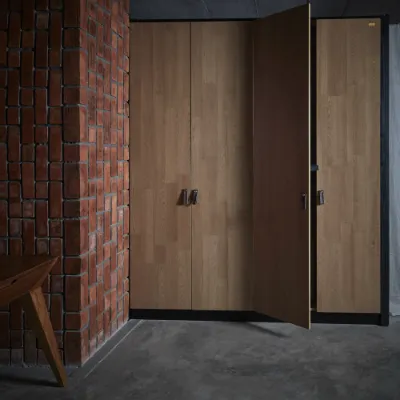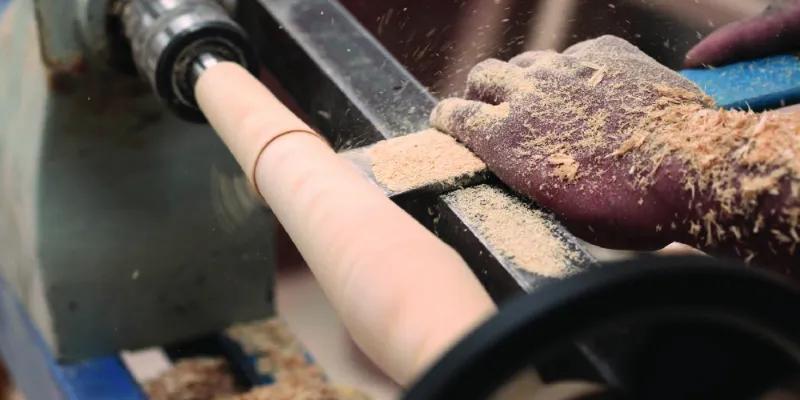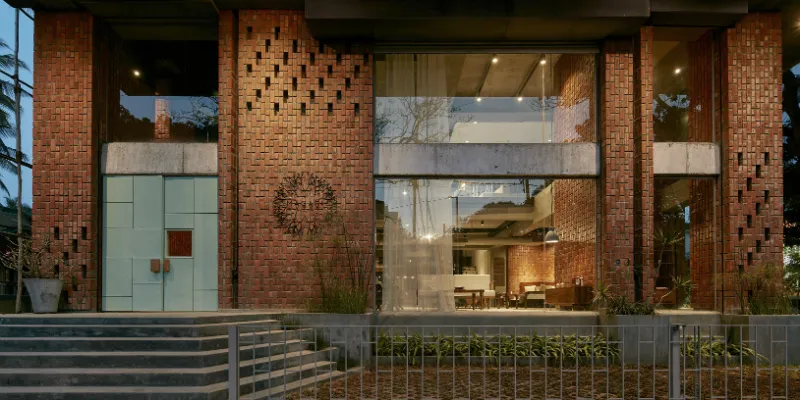With handcrafted cane furniture, this Bengaluru brand is on a million-dollar mission to crack the niche furniture segment
Magari’s range of curated and custom design furniture starts from Rs 18,000. Its target audience is home owners, architects, interior designers, hospitality clients, and commercial projects.
If you had to choose between sitting in a leather sofa or a cane sofa, which would you pick? Most of us will want to sit on the leather sofa. A lot of us are conditioned to think that expensive materials such as leather, linen or wood make the best and most comfortable furniture.
However, cane is a very diverse material. Not only can it be used for indoor and outdoor decor, but also is light, easy-to-clean, and eco-friendly. But the words cheap, uncomfortable, and unattractive sometimes come to mind when we think of cane furniture.
So in 2015, furniture and interior design experts Karun Mathew (36), Vishal Wadhwa (38), and Amitha Madan (35) decided to change this notion and bring cane back into the mainstream. They wanted to start a furniture brand in a market well-populated with modern players such as Pepperfry, Livspace, Urban Ladder, HomeLane, and more.

Magari co-founders and partners Karun Mathew (left), Amitha Madan (centre) and Vishal Wadhwa (right)
Launching ‘Magari’ in Indiranagar, Bengaluru, the business partners made it their mission to create a one-stop-solution for home interiors, with a focus on cane furniture and customised products.
“A group of close friends helped us identify, strategise and fund Magari in a way we could make a statement. We opened a store which would have multiple solutions and all home interior needs,” says Karun Mathew, Co-founder and Partner, Magari.
Now, Magari clocks a turnover of over $2.5 million (around Rs 17 crore), and has manufacturing units in India, Indonesia, Spain, and China. Investments over $1 million (around Rs 7 crore) have been made into Magari, Karun says, adding, “We are looking at a further investment of an equal amount to expand our manufacturing facilities and open further retail outlets.”
Team effort
Karun, who is also Director at Infinity Design Corp, had been manufacturing and supplying furniture and furnishings to the hospitality sector for a long time. Vishal, with his furnishing brand Yavanika, was also well-seasoned in the industry. “So, we realised they could extend our portfolio to the residential segment by starting Magari and opening a store,” Karun adds.
They roped in Amitha, an architecture graduate from BMS College of Engineering, Bengaluru. She had worked with several local architects and started her studio Treelight Designs in 2015.
“We had seen cane used for several generations,” Amitha says, “Cane work has always been a beautiful craft associated with antique furniture, and we wanted to bring it back.”

Magari's cane sofas
Magari also had to show that cane can be applied to products other than furniture, such as lights, home accessories, partitions, and more. This way, Karun, Vishal and Amitha could attempt to keep the craft alive.
Not an easy task by any means, this would mean making these ideas for cane furniture and furnishings appeal to the newer generation. The trio certainly thought they could pull it off.
In fact, the word ‘magari’ in Italian means ‘maybe’ or ‘perhaps’. In a way, it is symbolic of the partners’ hopeful attempt to bring cane back through a one-stop-shop for furniture.
Vishal says, “Housing carefully-curated designs, our furniture collection revives past traditions and art forms with modern detailing through the skills of local artisans. Further, our in-house brand Yavanika has a collection of eye-catching designer fabrics in a wide range of textures and colours. It also has drapes, throws, cushions, upholstery, wallpaper and blinds.”

A Magari wardrobe
Magari has also partnered with Decopad kitchens and wardrobes, an independent home grown brand whose products are available at the store.
Magari’s range of curated and custom design furniture starts from Rs 18,000. Its target audience is home owners, architects, interior designers, hospitality clients, commercial projects, or individuals interested in such furniture.
Vishal says that with the advent of extensive machinery, local artisans and carpenters were not getting a chance to use skills passed on to them.
“Our products are more than 75 percent handcrafted through skilled labour. This way, Magari aims to keep their skill sets alive and jobs intact,” he adds.
A class apart
This all-round approach make Magari’s products special, according to Amitha, who says, “Magari’s products are unique because the newer designs are a modern retake of traditional ones. While we have seen the use of cane in furniture traditionally, this revived approach pleasantly surprises everyone and gives it a unique feel.”
Further, handcrafting designs allows customisation of products. Magari’s use of technology in production is minimal, as a result. However, Vishal says the brand is making customised software to automate internal processes and reduce turnaround time of the products.

75 percent of Magari's products are custom made
Magari’s unique, handcrafted and customised furniture and furnishings have been used in the St. Regis, Maldives; a boutique resort in Rwanda, Africa; the Courtyard Marriott, Bengaluru; the Double Tree Hilton, Goa, and more.
“We have also worked with global architecture firms such as WOW, HBA, and other leading architectural firms across the globe. Our associations and partnerships today span over 16 countries, including the US, Russia, and some European countries," Karun says.
However, there are still questions the founders keep asking themselves. “We keep asking ourselves -is customisation a boon or a bane?” he says.
“As much as it is our USP to be customising products at a very micro level, the challenges continue to be the reliability on skilled labour as most of our products are handmade and labour intensive," he adds.

Magari's store front in Indiranagar, Bengaluru
He also says making 300 different products, each different from the other, continues to question the scalability of Magari’s model. “Till now, we have managed pretty well and we will continue to strive to achieve scale in this model,” he says.
With their combined experience, the Magari founders have clearly-defined roles in the business and each of them co-exist without stepping on each others’ toes, he adds.
They now plan to launch stores in Kochi, Hyderabad and Chennai. Magari is also looking at investing to expand its manufacturing unit in Bengaluru, and launch a new collection in 2020.
ALSO READ:
Delhi-based Studio Creo aims to cross the Rs 10-Cr mark in 2019 with its designer furniture







